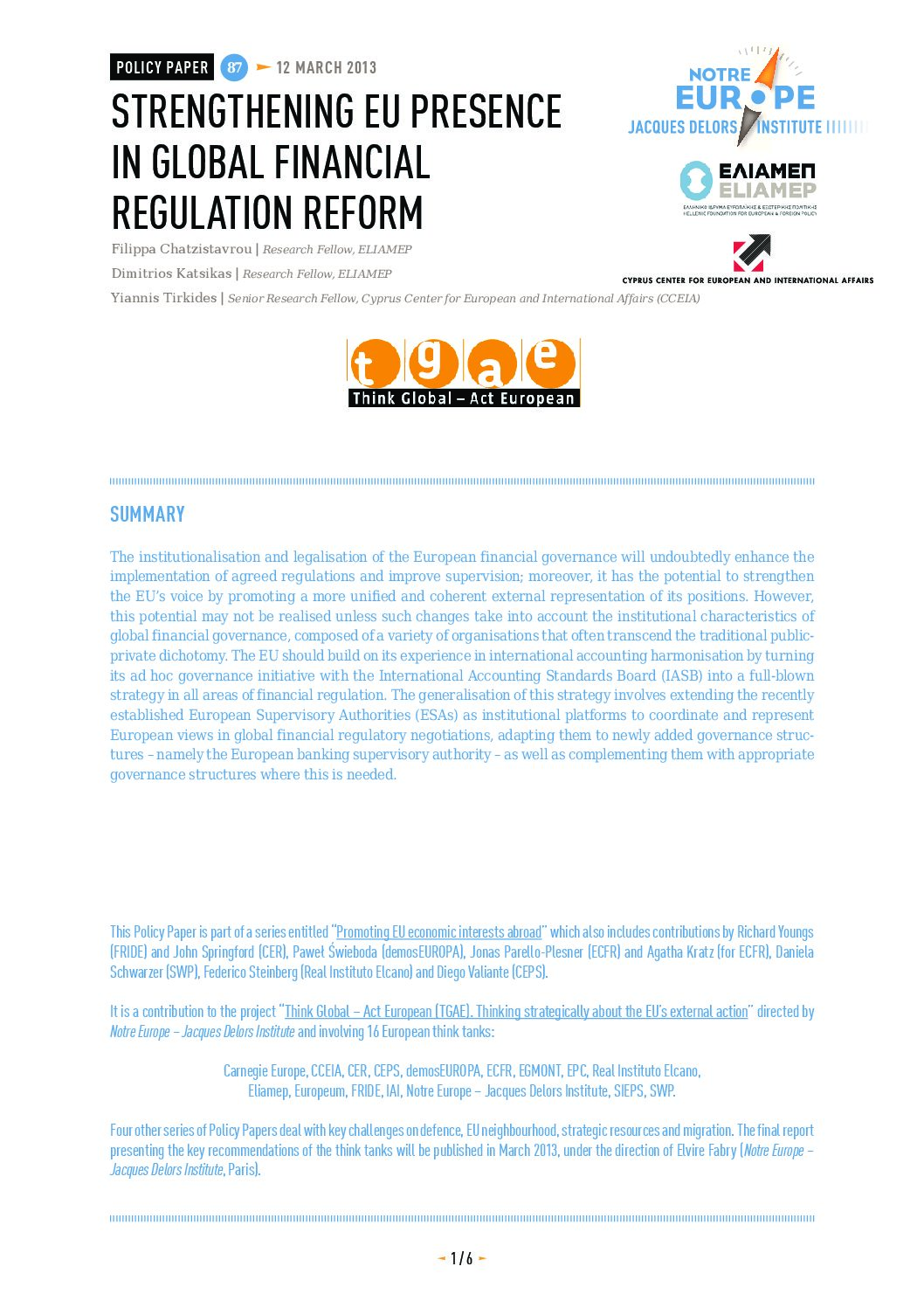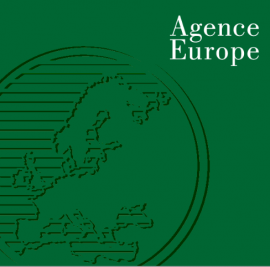Policy Paper 87
Renforcer la présence de l’UE dans la réforme de la régulation financière mondiale
Filippa Chatzistavrou, Research Fellow, ELIAMEP, Dimitrios Katsikas, Research Fellow, ELIAMEP, Yiannis Tirkides, Senior Research Fellow, Center for European and International Affairs (CCEIA)
? The institutionalisation and legalisation of the European financial governance will undoubtedly enhance the implementation of agreed regulations and improve supervision; moreover, it has the potential to strengthen the EU’s voice by promoting a more unified and coherent external representation of its positions. However, this potential may not be realised unless such changes take into account the institutional characteristics of global financial governance, composed of a variety of organisations that often transcend the traditional public-private dichotomy. The EU should build on its experience in international accounting harmonisation by turning its ad hoc governance initiative with the International Accounting Standards Board (IASB) into a full-blown strategy in all areas of financial regulation. The generalisation of this strategy involves extending the recently established European Supervisory Authorities (ESAs) as institutional platforms to coordinate and represent European views in global financial regulatory negotiations, adapting them to newly added governance structures – namely the European banking supervisory authority – as well as complementing them with appropriate governance structures where this is needed.
Ce Policy
Paper est une contribution de Yiannis Tirkides(CCEIA), Filippa Chatzistavrou et Dimitris Katsikas(ELIAMEP) au
projet Think Global – Act European (TGAE). Thinking Strategically
about the EU’s external action dirigé par Notre Europe – Institut
Jacques Delors (rapport disponible en mars 2013, dir. Elvire Fabry,
Chercheur Senior, Notre Europe – Institut Jacques Delors).
The institutionalisation and legalisation of the
European financial governance will undoubtedly enhance the implementation of
agreed regulations and improve supervision; moreover, it has the potential to
strengthen the EU’s voice by promoting a more unified and coherent external
representation of its positions. However, this potential may not be realised
unless such changes take into account the institutional characteristics of
global financial governance, composed of a variety of organisations that often
transcend the traditional public-private dichotomy. The EU should build on its
experience in international accounting harmonisation by turning its ad hoc
governance initiative with the International Accounting Standards Board (IASB)
into a full-blown strategy in all areas of financial regulation. The generalisation
of this strategy involves extending the recently established European
Supervisory Authorities (ESAs) as institutional platforms to coordinate and
represent European views in global financial regulatory negotiations, adapting
them to newly added governance structures – namely the European banking supervisory
authority – as well as complementing them with appropriate governance
structures where this is needed.
publication du rapport final présentant les recommandations clés des 16 think tanks mobilisés dans ce projet, 5 séries
de Policy Papers portent sur les sujets suivants : Politiques économiques, Migration, Voisinage de l’UE, PSDC,Ressources stratégiques.
Ce Policy Paper
fait partie de la série intitulée «Comment mieux promouvoir les intérêts économiques européens à travers le monde ? » qui
comprend les contributions de John Springford (Centre for European
Reform), Richard Youngs (FRIDE), Agatha Kratz and Jonas Parello-Plesner
(ECFR) , Daniela Schwarzer (SWP), Federico Steinberg (Elcano), Diego
Valiante (CEPS), Pawel Swieboda (demosEuropa).
Voir les
autres contributions de la série politiques économiques >>
Ce projet est mené avec le soutien du
SUR LE MÊME THÈME
ON THE SAME THEME
PUBLICATIONS
[EN] L’avenir des emprunts communs

Transparence verte européenne
Leçons françaises et marges de progrès

Plan de relance européen : place aux obligations vertes et sociales !

MÉDIAS
MEDIAS
Finance durable : après la transparence, le temps des résultats est venu

Union européenne: le désendettement n’est pas la priorité

Mario Monti and Pascal Lamy call for joint issuance of public debt at EU level




















